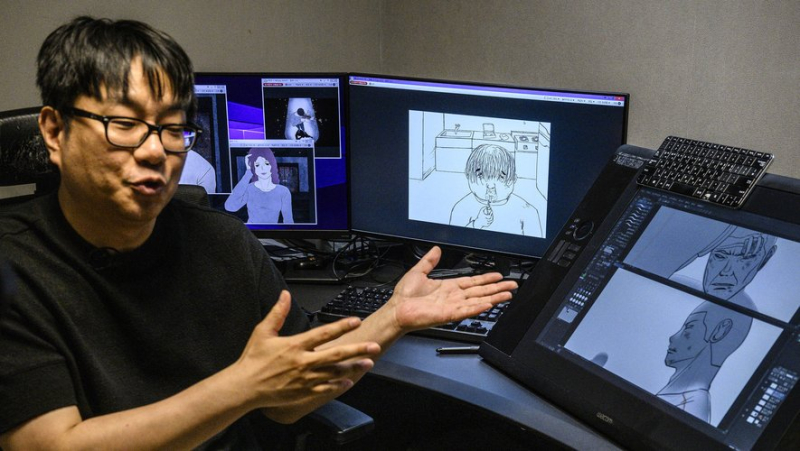How to explain the irresistible rise of webtoons, these online comics, in South Korea ?

“Money Game”, l'un des deux webtoons de Bae Jin-soo qui ont inspiré la série sud-coréenne “The 8 Show” diffusée sur Netflix, raconte l'histoire d'un jeune homme criblé de dettes après avoir investi en cryptomonnaies. ANTHONY WALLACE/AFP
When Bae Jin-soo left his high-paying job at one of South Korea's largest conglomerates to write stories, his parents were so shocked they put him on at the door.
Seventeen years later, he is one of the biggest names in South Korea's thriving webtoon industry. As evidenced by the adaptation on YouTube and Netflix of several of his creations.
Designed especially to be read online, these comics are enjoying dazzling success in South Korea. In 2022, the value of companies in the sector totaled about $1.33 billion, up from $109 million in 2013, according to South Korean government figures.
Symbol of a growing sector, the famous online comics platform Webtoon Entertainment, owned by Korean giant Naver, filed an application at the end of May to be listed on Nasdaq, the stock exchange American technology companies.
Its valuation could reach $2.6 billion, according to a document in the file. However, when Bae Jin-soo began his career in webtoons, his parents, like many other people at the time, told him that "comic book artist" is no way to earn a living, he says today.
His friends, too, expressed a certain reluctance because he did not "know how to draw". Alongside a part-time job in a convenience store and as a pizza delivery boy, Bae Jin-soo taught himself how to draw by photographing himself and those around him and then copying the photos with paper and a pencil.
Unconvinced by his first productions, readers push him to work harder. In 2023, Bae Jin-soo ended up publishing his first hit on Naver entitled "Friday".
BD adapted for smartphones
Appearing around twenty years ago, these comics that can be read by scrolling on your phone were powered by South Korea's ultra-fast internet and a population addicted to smartphones. They are now becoming the new viral South Korean cultural product around the world.
The Webtoon Entertainment platform now has nearly 170 million visitors per month in more than 150 countries. It claims to have paid more than $2.8 billion to authors from 2017 to 2023.
The "average professional designer earns $48,000 per year while the top 100 earn $1 million", says Webtoon Entertainment CEO Junkoo Kim.
Webtoons have gradually infiltrated other sectors of the entertainment world. They have already inspired a number of K-drama series, including "Misaeng" (2014), "Yumi's Cells" (2021), "Marry My Husband" (2024) and "The 8 Show" (2024) which is inspired by two webtoons written by Bae Jin-soo.
“Actors and actresses are familiar with webtoons and are willing to play the roles, which is a strength for the casting,”, K-drama series producer Park Soon-tae told AFP.
While webtoon adaptations into television series are increasing, many readers remain loyal to the original format. Online reading allows "stories to develop and evolve in real time as the reader scrolls through the pages,", CEO Junkoo Kim said in a letter filed with the U.S. Securities and Exchange Commission.
From Comics to TV Series
Of the 14 South Korean series Netflix launched last year, at least seven were based on webtoons. "One of our goals is to find shorter, under-explored stories that resonate with webtoon fans and new audiences around the world", Keo Lee, director of content at Netflix in South Korea, told AFP.
Many themes are addressed in these works. But the authors were particularly interested in the "despair of the younger generations", underlines Dal Yong Jin, author of the book "Understanding Korean Webtoon Culture" (Understanding the culture of Korean webtoons) published in 2022 by Harvard University Asia Center.
"Money Game", one of Bae Jin-soo's two webtoons that inspired the South Korean series "The 8 Show" broadcast on Netflix, tells the story of a young man riddled with debt after investing in cryptocurrencies.
He and seven other people decide to participate in a game in which they must survive 100 days in an enclosed space, which doesn't even have a toilet, to win a prize.
In this game, the cost of living is 1,000 times higher than in the real world, but every penny spent by participants is deducted from the final reward.
For the author, "the hardest thing is to give up what you have" . "Being from the very bottom, even the smallest gains always brought me joy", he says.




